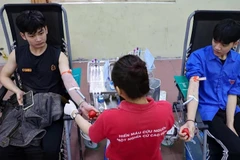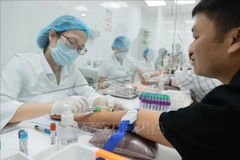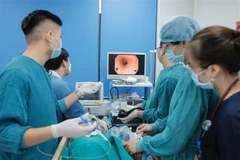Hanoi (VNA) - Inappropriate dietary and lifestyles have hindered Vietnamese people from preventing and treating contemporary diseases, health experts have warned.
Dr Tran Tuan, Director of the Hanoi-based Research and Training Centre for Community Development, said that Vietnamese people were facing many contemporary diseases, namely cancer and mental and behavioural disorders.
He said that metabolic and endocrine disorders have also been increasing lately.
"Children in modern times become pubescent earlier than before, partly because of diet," Tuan said.
He warned that other diseases such as obesity, high blood cholesterol and eye problems were at high levels in the country.
Meanwhile, deputy head of the National Institute of Nutrition, Nguyen Thi Lam, said that high blood pressure, obesity, cardiovascular problems and diabetes were rapidly increasing in recent years.
"In 1990, there were 8 to 9 percent of grown-ups in Vietnam suffering high blood pressure. That was already a high increase in comparison with 1960 with only 1 percent. But now the figure is up to 30 percent," she said to Tuoi Tre (Youth) newspaper.
Lam said that the high rate was related to the salty diet of many Vietnamese people.
"A Vietnamese person normally consumes a salt portion which is double to triple that of the recommended 5mg a day," she said, adding that salt intake came from different types of popular food in Vietnam such as pickles and salted meat.
She also said that Vietnamese people's diet in modern time was unbalanced with less vegetables and fruits.
"On average, a Vietnamese person now eats only 200 grams of vegetable, which is just half of the recommended amount. Meanwhile, the consumption of fruit is just 80 grams a day, which is less than the recommended 100-300 grams," she said.
The diet in modern times was said to lack whole-grain cereals and unsaturated fat.
Lam recommended people maintain a traditional family diet with more vegetables and fruit. People in urban areas are recommended to eat less meat and more beans and peas, drink more traditional herbs instead of fizzy drinks.
The nutritionist also blamed a lack of exercise among Vietnamese people as causing contemporary diseases.
Regarding the refractive errors, Lam said the diseases were caused of eye-using habits, sitting posture and sitting period.
"A recent research shows that Vietnamese children sit a lot. Besides the sitting time at school, many children are spending an additional of three hours sitting for eating, playing and watching TV," she said.
Lam urged Vietnamese people to exercise more, at least 30 to 60 minutes a day for walking, running and other activities.-VNA





























